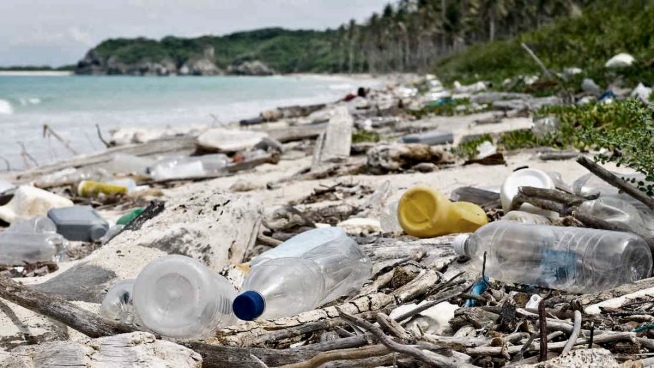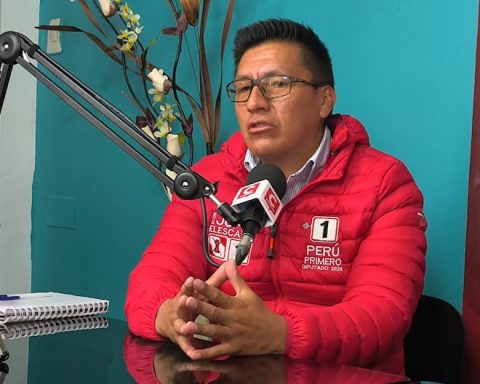The fifth session of the United Nations Environment Assembly (UNEA 5) agreed this week to create the first international treaty against plastic pollutionan initiative in which Argentina participated and which scientists characterized as “historic”, while pointing out the difficulties in reversing this crisis in a world where even what we drink, eat and breathe has plastic particles.
At the meeting that ended on Wednesday in Nairobi, the Kenyan capital, 175 countries supported this agreement, including Argentina through the Ministry of Environment and Sustainable Development with the participation of Cecilia Nicolini, Secretary of Climate Change, Sustainable Development and Innovation.
The proposal establishes address the entire life cycle of plasticfrom its origin to the sea, and orders the creation of an “Intergovernmental Negotiating Committee” in charge of elaborating a legally binding international agreement by 2024.
“We are more than satisfied with the challenge that this treaty implies to be binding and oblige States, companies and society to modify the consumption of plastics”Manuel Jaramillo, general director of the Fundación Vida Silvestre Argentina
“We have been promoting the treaty for a long time and we followed the Argentine commitment to adhere to this United Nations declaration,” Manuel Jaramillo, director general of the Fundación Vida Silvestre Argentina, told Télam.
“We are more than satisfied with the challenge that this treaty implies to be binding and oblige States, companies and society to modify the consumption of plastics,” he added.
According to the Organization for Economic Cooperation and Development (OECD), of the 460 million tons of plastics produced in 2019 globally, less than 10% is recycled and 22% were abandoned in makeshift dumps, burned in the open air or dumped in the wild.
Andrés Arias, a Conicet researcher at the Argentine Institute of Oceanography (IADO), was the only scientist in the country to participate in the United Nations (UN) report entitled “From contamination to the solution,” which was presented in October 2021 as a basis for discussions at UNEA 5.

In dialogue with Télam, Arias assured that the decision of the UN is a historical fact for being the “global agreement, in environmental terms, the largest since 2015 after the Paris Agreement against climate change”.
For the doctor in Biology it is essential to reverse this contamination because plastics generate physical, chemical and toxicological damage, among which he highlighted the impact of abandoned nets in the sea that trap animals such as sea turtles and dolphins, causing injuries, suffocation, mobility restrictions and death.
Another problem is when fish ingest the plastic fragments smaller ones that cause “changes in their reproductive cycle and in their body, which begins to defend itself from the foreign compound in its digestive system”.
Arias also warned about the impact on people: “We can ingest plastics from tap or packaged water to seafood and salt, they can even be breathed in because the very small particles float in the air and have the ability to trigger inflammatory and allergic responses.”
“We can ingest plastics from tap or bottled water to seafood and salt, they can even be breathed in because very small particles float in the air”Andrés Arias, PhD in Biology
“They cross cell membranes, the digestive tract, even in clinical studies microplastics smaller than 5 millimeters were found in human placenta”, detailed the scientist and added that we eat plastic unconsciously because almost all food comes in packaging made from fossil fuels.
According to the study “Plastic diet” of the World Wide Fund for Nature (WWF) we consume more than 100,000 plastic microparticles a year, which is equivalent to eating a credit card per week.
In our country, the level of contamination by plastics in aquatic environments is “very similar to the rest of the world, we do not have areas of very high impact,” said Arias.
However, he warned that “where we have searched we have found” and cited as an example a survey on the side of nine patagonic lakeswithout population on its margins, where they found microplastics in all of them.
In the Buenos Aires coast Contamination is also evident: 84.5% of the waste found was plastic, according to the latest edition of the Provincial Marine Coastal Garbage Census carried out in October 2021 by different NGOs.
Something similar happens in the banks of the Parana River, where “really worrying plastic values located almost all in the vicinity of the most important cities” were found, he explained to Télam Martín Bletler, associate researcher of the Conicet at the National Institute of Limnology (Inali).

Since 2016, his group of research carries out studies in the Middle Paraná basin, covering the provinces of Santa Fe and Entre Ríos, where they found that most of the plastic waste is single-use, that is, “what is in the supermarket is found in the river,” he said.
“This is telling us about a deficient urban solid waste management policy”, pointed out the scientist and considered that efforts have to be made in that direction, but not only educating the population about responsible consumption, but also developing policies to reduce the use of plastics moving backwards in the hierarchical scale of responsibilities.
For the doctor in Biological Sciences, “The problem is that plastic bottles are produced because they are cheaper and not because they are a real need.”
Along the same lines, Arias asked bring the solution to the producers because it is “a complex chain that starts from oil production, the large plastic producers, the packaging producers and then the consumers.”
To mitigate pollution, the specialists agreed that, together with national policies, global agreements are needed to change the production matrix.
To mitigate contamination, specialists agreed that Along with national policies, global agreements are needed to change the production matrix.
“Most of the plastic resins that are produced worldwide today are 100% non-biodegradable, which is why it is necessary to redesign the product with more environmentally friendly engineering,” Arias said, stressing the importance of developing a circular economy, where products can be recycled in an easy and standardized way.
“The big problem with plastic is that it seems like a highly recyclable product, but it isn’t”pointed out and explained that when recycled plastics are mixed they are different because the producers used different additives and dyes.
Regarding the expectations regarding the global agreement that should be ready by 2024 with goals to reduce pollution, the researchers pointed out that it is necessary to wait how the negotiations continue.
“It’s a really important decision, but I think it’s just the beginning of a very hard road because big corporations will have to be faced now,” concluded Blettler.
The Congress has a Packaging Management project
The draft law on Minimum Budgets for Environmental Management of Packaging and Promotion of Inclusive Recycling that introduces the principle of extended producer responsibility was promoted in Congress by the Ministry of the Environment and must obtain an opinion again in the Environment and Budget Commissions of Deputies for not having been treated on the premises before the end of the regular sessions last year.
Environmental organizations and scientists consulted by Télam They pointed out that a packaging law is necessary that makes manufacturers responsible for the environmental impact generated by their products. in the post-consumption stage.
For Andrés Arias, researcher at Conicet at the Argentine Institute of Oceanography (IADO), this principle of responsibility is “something quite advanced, since not all the countries classified as first world have it”.
“The extended producer responsibility laws bring the solution to those who produce the plastics and they are very necessary,” the scientist told Télam, while asking that the project be extended to other products such as tires, which when worn lose up to 8 kilos of plastic microparticles.
The general director of the Fundación Vida Silvestre Argentina, Manuel Jaramilloalso highlighted the importance of enacting a law so that the “containers that we frequently see floating in streams, rivers or in the sea have the purpose they should have, which in the first place is recycling, reuse and, if it is not possible, the final disposition in an appropriate way”.
In our country there are about 5,000 open-air dumps and irregular final disposal sites that become a source of employment for a large number of informal reclaimers, according to data from the Ministry of the Environment.
“We have to work on what is the extended responsibility of the producer so that there is an active participation of those who produce these containers through the mechanisms that are discussed in the legislative process,” added Jaramillo.
According to the Chamber of the Plastic Recycling IndustryI know they recycle in the country about 258,000 tons per year of that material and it is estimated thathe installed plastic recycling capacity still shows 60% idleness.
Another standard to mitigate plastic pollution is the Microplastics Law No. 27,602which was sanctioned in 2020 and made Argentina the first Latin American country to ban the production and import of cosmetic and hygiene products containing added plastic micro-beads.
The law will be effective from Decemberafter two years where the industry had time to adapt.
“There are microplastics that are used as abrasives in many cosmetic products such as toothpaste or facial cleansing creams, and these particles quickly go into the water and contribute to global pollution,” Jaramillo explained.















